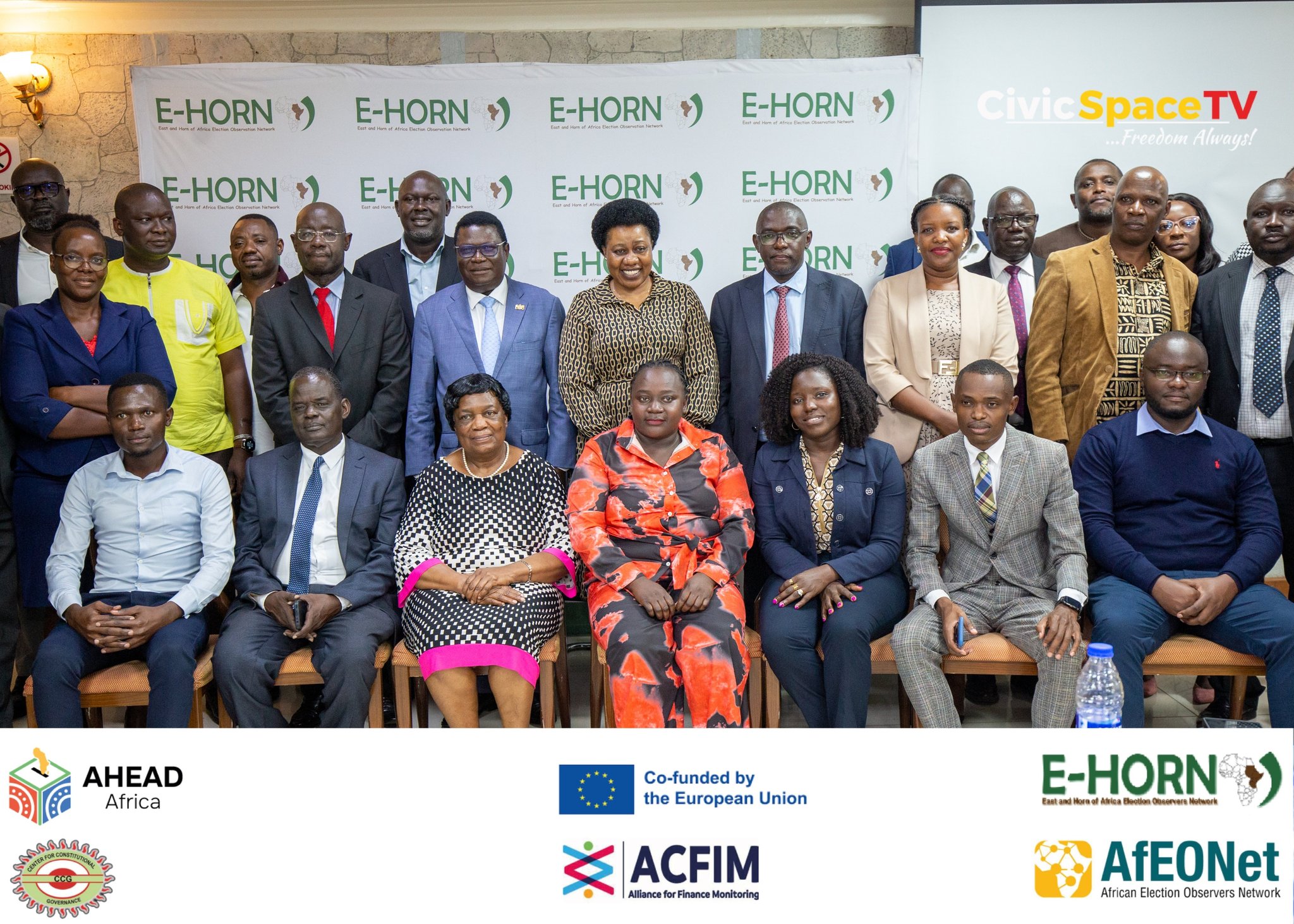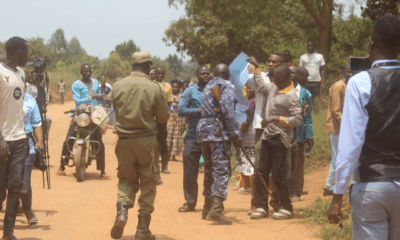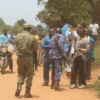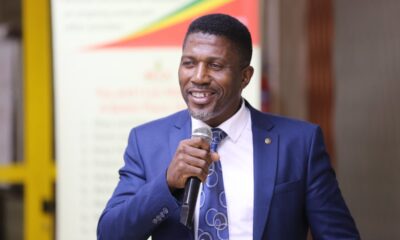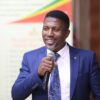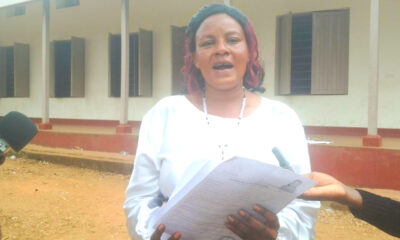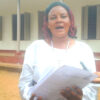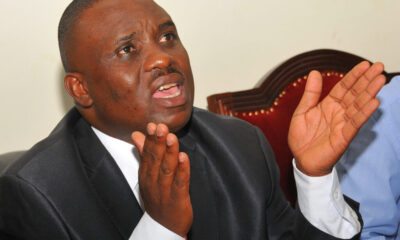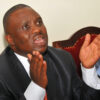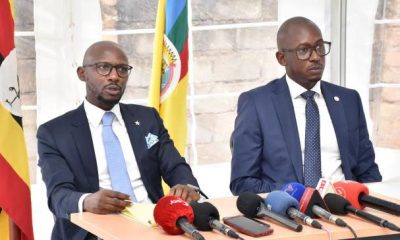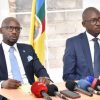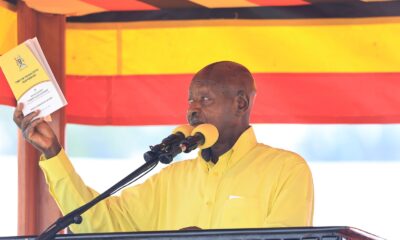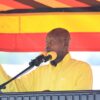Politics
Stakeholders Demand Transparency, End to Violence for Credible 2026 General Elections
As Uganda steadily approaches the 2026 general elections, key stakeholders converged at Hotel Africana today for a crucial multi-stakeholder dialogue, emphasising the urgent need to strengthen electoral integrity to ensure truly free and fair polls. Organised by the Centre for Constitutional Governance (CCG), the event brought together civil society, electoral bodies, government representatives, and international observers to address persistent challenges and chart a path forward.
Dr. Bireete Sarah, Founding Partner and Executive Director of CCG, set the tone for the dialogue, highlighting the theme “Bread for Free and Fair Through Strengthening Electoral Integrity,” which aligns with the broader “Ahead Project” focused on bolstering electoral integrity across Africa. “Credible, free, and fair elections require a strong foundation,” Dr. Bireete stated, outlining essential conditions including an independent Electoral Commission, an updated and inclusive voter register, equal access for all political actors, freedom of expression and assembly, neutral security forces, transparent results management, an effective legal framework, and robust civic and voter education.
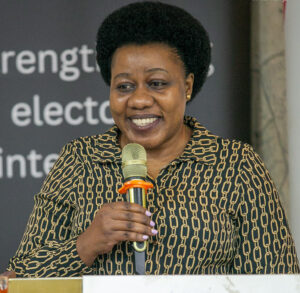
Dr. Bireete Sarah,
Dr. Bireete did not shy away from enumerating the key challenges plaguing Uganda’s electoral landscape. She decried the increasing trend of human rights violations, a concerning “blockade on some media, [like] NTV, Delmont and LPs, for the last three months,” hindering crucial local coverage. She also raised alarm over the “blockade on some society organizations,” some of whom “were right to conduct voter education, but “are never accredited.” Other critical issues identified included the “extreme commercialisation of politics,” “high levels of violence,” abuse of state resources, impunity, selective application of the law, and a perceived lack of assertiveness from the Electoral Commission in ensuring free and fair processes, citing the Kawempe by-elections as an example.
A significant concern raised by Dr. Bireete was the lack of transparency in the tabulation and transmission of results, particularly at the National Tally Centre, which she noted “was mainly by security forces and members of the international community analysis,” with domestic observers reportedly blocked and even arrested in 2021. She also pressed for clarity on the legal framework governing electoral technologies, especially in light of the President’s repeated calls for electronic voting, questioning the Electoral Commission’s preparedness and communication on the matter.
Dr. Bireete concluded her remarks with two urgent appeals: “Can we stop violence in elections by the Electoral Commission coming up with a clear code of conduct for security agencies that should be publicised,” and “increased transparency at all levels of transmission, the duration and announcement of results, especially presidential results.”
Adding a powerful voice to the discussion, Ms. Mariam Wangadya, Chairperson of the Uganda Human Rights Commission (UHRC), underscored her commitment to peace, justice, and the protection of every citizen’s right to participate in Uganda’s democracy. Viewing the 2026 elections as a crucial period, Ms. Wangadya expressed optimism and emphasised the UHRC’s heightened engagement and monitoring efforts.
“Elections are not just about ballots, but about dignity,” she stated, acknowledging past challenges of fear, violence, and intimidation. She urged all stakeholders to learn from previous experiences, emphasising the need for proactive prevention of violence, rather than reactive measures. Ms. Wangadya specifically called upon the Electoral Commission for transparent processes, security forces for fairness and protection of rights, media for upholding truth, and the government for adequately funding voter and civic education.
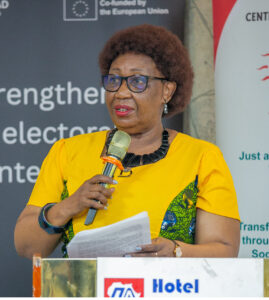
Ms. Mariam Wangadya, Chairperson of the Uganda Human Rights Commission
She posed three guiding questions for the forum: “Are processes grounded in data? Two, are we putting the real, flexible, Democratic integrity, or do we propose just surface-level reforms? Are our institutions, the Electoral Commission, security agencies, and civil society, coordinated and ready to ensure the civil election?”
Mr. Julius Muchunguzi, Head of Public Relations at the Electoral Commission, reaffirmed the commission’s commitment to credible, free, fair, and peaceful elections. He stressed the importance of adherence to electoral laws, enhanced participation, and effective civic education to improve voter turnout. While condemning electoral violence, he highlighted the need for competitive elections based on ideas and manifestos, rather than solely on individuals. Mr. Muchunguzi echoed the Chairperson of the UHRC’s call for transparency and timely communication from all stakeholders, noting that “delay the communication sometimes breeds suspicion.”
Minister Nobert Mao, the Minister of Justice and Constitutional Affairs, offered a candid perspective on the role of the state and security forces. He asserted that the primary duties of the state are to guard borders, protect citizens from harm, enact laws, and adjudicate disputes. He strongly condemned the routine deployment of the army in civilian matters, viewing it as a “vote of no confidence in the police.”
He further stated that “We are bringing the army to deal with civilians should not be the order of the day. It should be a last resort, really.” While acknowledging the necessity of specialised forces like the Joint Anti-Terrorism Task Force (JATT) for serious threats in the volatile Great Lakes region, he emphatically stated that “I don’t think the civilians that are demonstrating or protesting are real enemies of Uganda. Disorderly conduct can be contained by the police.”
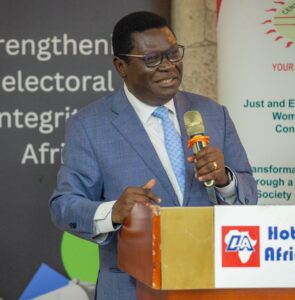
Minister Nobert Mao, the Minister of Justice and Constitutional Affairs
Minister Mao further condemned the “commercialization of politics,” asserting that it “thrives on vulnerable citizens.” He advocated for robust civic education and proactive government initiatives to improve living conditions, deeming these essential to mitigate the influence of money in politics. Despite the acknowledged challenges, Mao expressed hope for Uganda’s electoral future, particularly with the anticipated introduction of biometric voter verification machines.
“The EC’s budget has been increased, and we’ll have purpose-built machines to ensure the integrity of the process,” he stated, adding a resolute call to action: “Citizens must demand everything necessary to ensure a peaceful and credible election.” The discussions underlined a collective commitment to fostering a more transparent, peaceful, and truly democratic electoral process in Uganda
Comments



